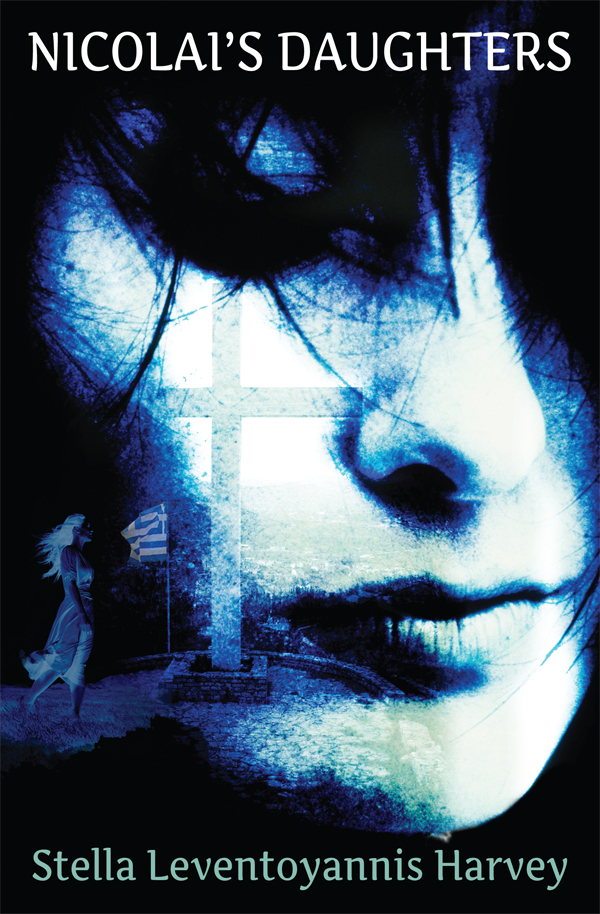 I read Stella Leventoyannis Harvey’s first novel, Nicolai’s Daughters, as part of the FictionKNITstas project. Even before I picked up the book, I was concerned about what would happen if I didn’t enjoy it—having to work with the author on a knitted garment for the tour. Fortunately, I didn’t need to worry. Just a few chapters into the book I was pulled into the story and engaged with both Nicolai and his daughter Alexia.
I read Stella Leventoyannis Harvey’s first novel, Nicolai’s Daughters, as part of the FictionKNITstas project. Even before I picked up the book, I was concerned about what would happen if I didn’t enjoy it—having to work with the author on a knitted garment for the tour. Fortunately, I didn’t need to worry. Just a few chapters into the book I was pulled into the story and engaged with both Nicolai and his daughter Alexia.
Compelled to fulfill her father’s dying wish to find the half-sister he kept from her, Alexia arrives in her father’s village of Diakofto on the edge of the Peloponnese. There she discovers a culture she knows nothing about, a country in financial crisis, and an extended family with too many secrets.
The Sarinopoulos family has long been marked by tragedy, war, and a shame fanned by idle village gossip. Looming over Alexia’s visit and the one trip back to Greece her father had taken twenty-five years earlier, is the tragedy of Kalavryta, a Second World War massacre that changed the family forever.
Told in alternating voices of Alexia and Nicolai, who each return to Greece to mourn a loss and find solace, Nicolai’s Daughters uncovers the secret shame that festers in a family, refusing to heal until the truth is revealed.
From the publisher, Signature Editions (October, 2012)
The setting is abruptly shifted from Canada to Greece, making the reader and the main character Alexia feel lost and isolated. Alexia draws into herself as her extended family continue to hide secrets as they have for years. In Diakofto, a small-town mentality is evident, where everyone knows each others’ secrets, but no one really talks about anything. This mentality irks Alexia, who comes from Vancouver and is used to facing problems head-on and not pussyfooting around issues—true to her profession as a lawyer.
However, with a tragedy like the massacre of Kalavryta where all the men and boys over 13 were shot and killed, it is understandable that people are hesitant to reopen past wounds. Alexia finds that understanding her father means understanding her grandfather too, both of whom are deceased. Her grandfather was one of the few boys who survived Kalavryta, which affected his family deeply and often imperceptively. Nicolai, being the only son, had certain pressures and expectations from his traditional father. He left for Canada and never returned, except upon the passing of his wife, where he left his only daughter with family friends. It was during this trip back to Greece that is narrated for the novel, and explains the half-sister Alexia has.
I was happy that the story didn’t devolve into a murder-mystery-style narrative, where the main character focuses on solving the problems and discovering the secrets. The conflict stays focused on Alexia and each time we and thrown back in time to Nicolai’s visit to Greece following the death of his wife (Alexia’s mother), we learn just a little more about his character’s drive and emotion. Although Alexia never fully understands her father, the questions she finds answers to are enough to allow her to move on. Thankfully, with the glimpses we get of Nicolai, the reader has more questions answered for us.
The characters—both main and secondary—are so full-figured and emotionally complete they feel alive. Alexia’s loneliness makes her feel void or bereft of complex emotion, but the actions and responses of her Greek family are completely dynamic. They are incredibly well-written and the cultural idiosyncrasies of the people are relatable and approachable. As the author has stated in an interview, “I love the hospitality, the openness, the generosity of Greeks and at the same time I also felt that there was some fear of happiness, something inherently sad and complacent, something at the root of all the superstitions I grew up with. I wanted to explore this contradiction.” Nicolai’s Daughters is much more about the character’s journey(ies) of discovery as they unravel their family history and the cultural contradictions they face. I both laughed and cried as the story of this family unfolded.
Stella Harvey lives in Whistler, BC and is founded The Vicious Circle writing group in the area. The Vicious Circle organizes the Whistler Readers and Writers Festival which started in 2001 as a large gathering in her living room on a Friday night. Stella’s family is Greek but she was born in Cairo, Egypt and raised in Canada. Her extended family still lives in Greece and she is fluent in the language, visiting often.
Full disclosure: I received a copy of the book free as part of the FictionKNITstas project. A review was not required and all thoughts and opinions are my own.






1 Pingback